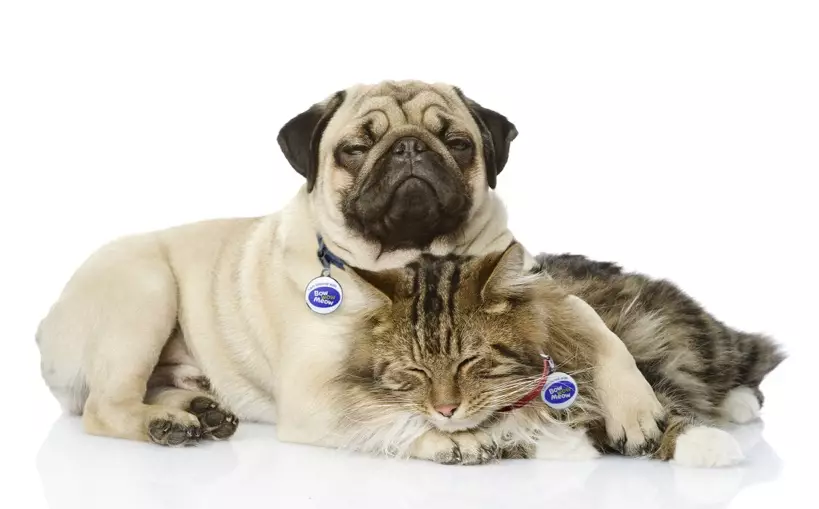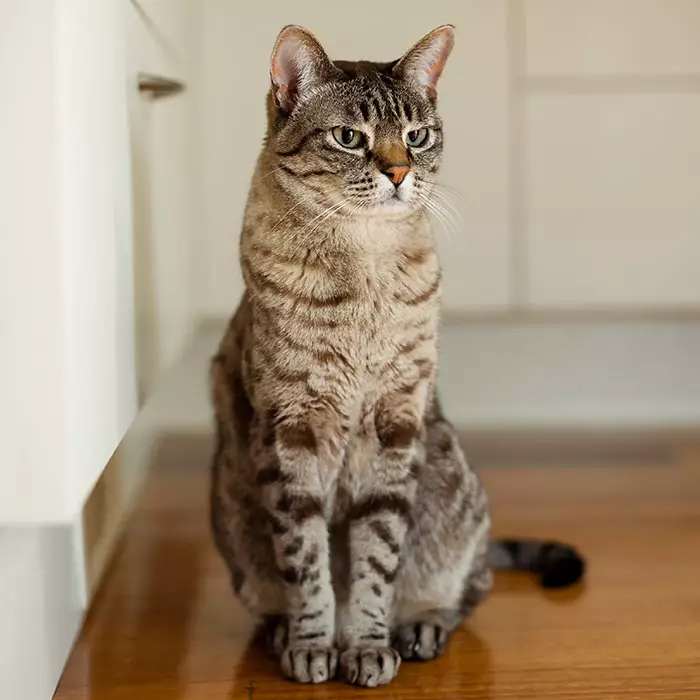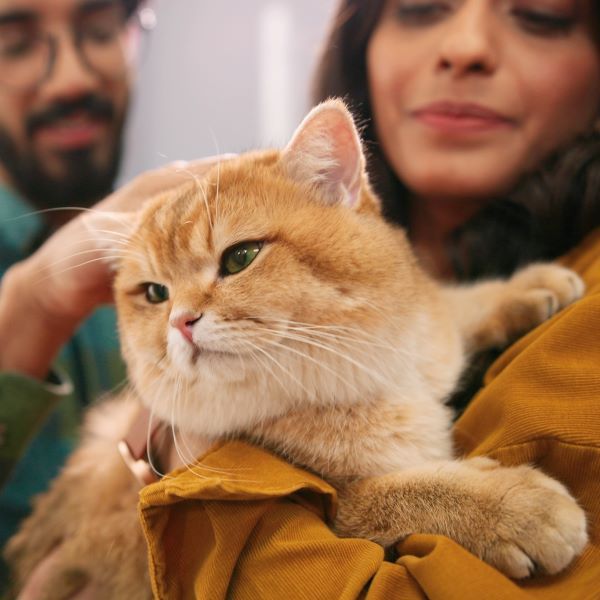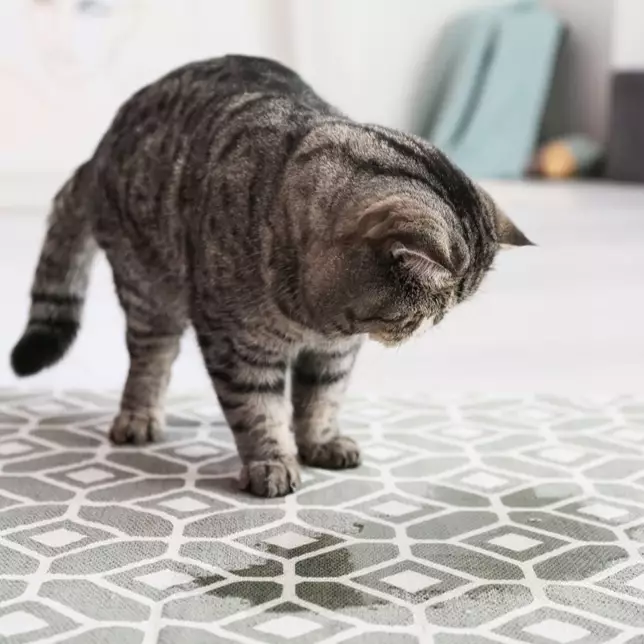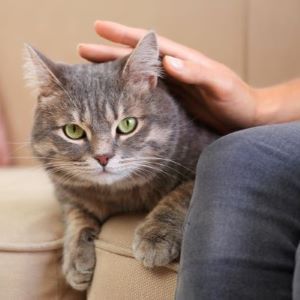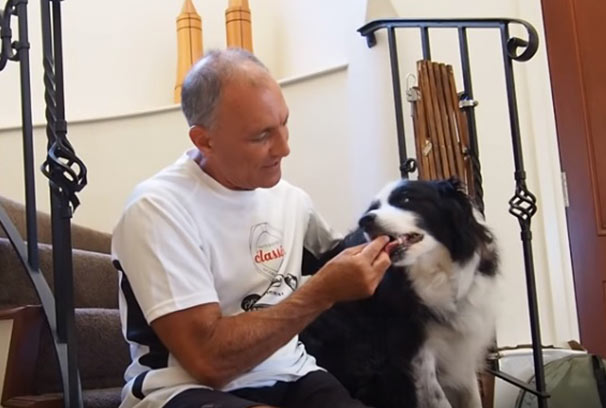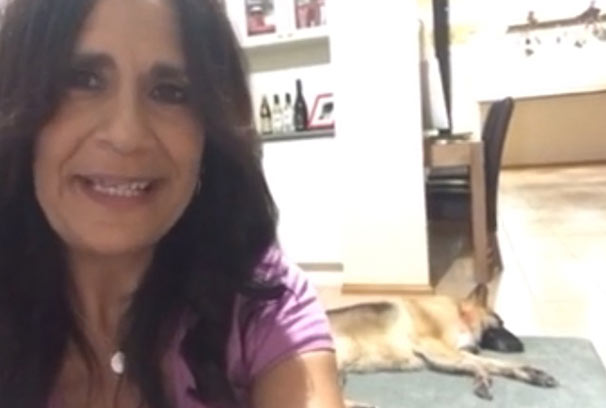How to tell if your cat is sick? Know the signs
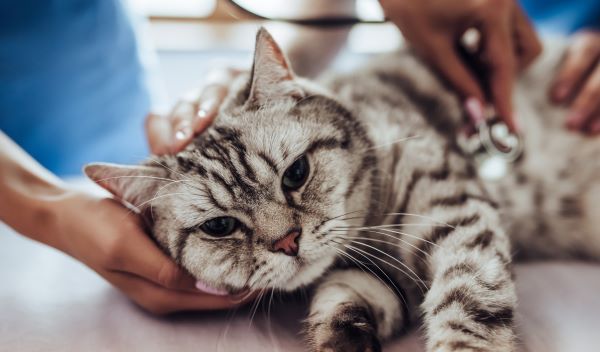
Importance of being attentive to your cat’s health
If only our cats could tell us when they aren’t feeling well or are in pain! Knowing when your pet is unwell isn’t always easy. Sick cats are notoriously good at masking symptoms, especially in the earlier stages of an illness. So by the time you realise that your cat may be sick or in pain, their condition may already be fairly advanced.
 Regular check ups at the veterinarian are essential, but what can you do between vet visits to ensure your pet’s well-being?
Regular check ups at the veterinarian are essential, but what can you do between vet visits to ensure your pet’s well-being?
You know your furry friend better than anyone else and can perhaps sense when they just don’t seem their normal self. Monitor them closely and if something feels not quite right, it is best to speak to a vet.
Common signs and symptoms to watch for
Other than relying on your gut feel, we recommend that you learn as much as you can about the most common symptoms that may be exhibited by sick cats. Many of these symptoms are very subtle, so it’s super-important to be aware of what they are and to try to look out for them.
Signs and symptoms of illness in cats
- Vomiting, upset stomach or diarrhoea (common symptoms and first signs of many illnesses)
- Coughing, sneezing, excessive panting, breathing difficulty or other respiratory problems
- Changes in appetite
- Change in grooming behaviours
- Vocalisations such as excessive meowing
- Changes in litter tray behaviour
- Hiding
- Increased sleeping, lethargy
- Agression, irritability
- Reluctance to be handled, growling when handled
- Changes in facial expression or whisker position
- Changes in mobility, posture and movement
- Reduction in play behaviour or interactions with family and other pets
When to take your cat to the vet
Importance of seeking veterinary care in a timely manner
If you notice any of the obvious signs, or even any subtle changes, that indicate that your pet may be unwell, it’s important to consult your veterinarian, who is your best resource to determine the underlying cause of the problem, rather than relying on “Dr Google” for a diagnosis.
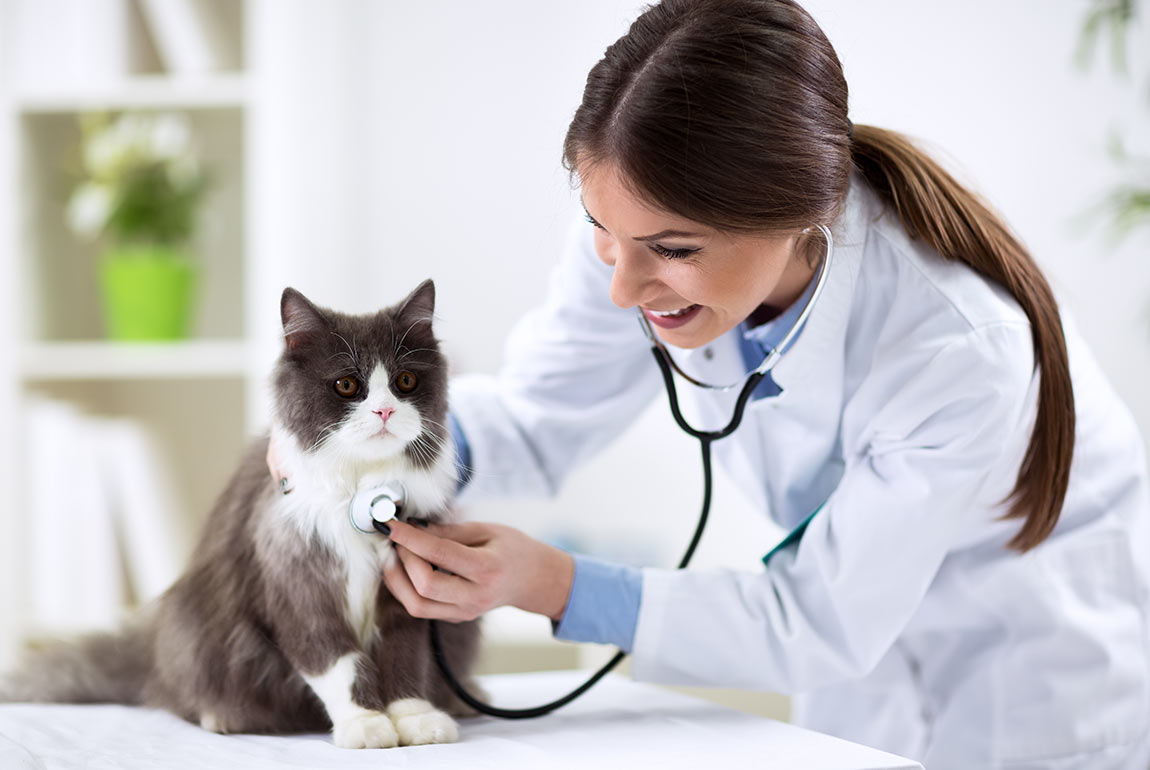
Signs that require immediate medical attention
Pets that exhibit any of the signs or symptoms below should be taken to the vet as a matter of urgency:
- Excessive diarrhoea and/or vomiting (multiple times lasting more than a day)
- Seizures
- Lack of coordination/inability to stand
- Difficulty breathing
- Hard, distended abdomen
- Inability to urinate
Signs and symptoms alone don’t generally indicate what problem is or how to treat it, and diagnostic testing by a veterinarian is often necessary for this purpose. When your cat has serious condition such as a urinary tract infection, kidney disease, hyperthyroidism or pancreatitis to name just a few, early diagnosis is key to a quicker recovery and/or more effective management.
Your pet may require diagnostic tests such as a complete blood count, urinalysis, electrolyte tests or an ECG to check heart rhythm. These tests need to be performed by a trained veterinarian.
Unsure how serious it is?
Bow Wow Meow policyholders can get access to trusted vet care anytime, anywhere, at no additional cost. Connect to an experienced Australian registered vet via video call, 24/7. Whether it’s providing vet advice, setting up at-home treatment plans, or confirming if you need to visit a vet in person, you can get help when you need it.
Find out more about our pet insurance cover options.
Recommendations for routine check-ups and pet vaccinations
We can’t stress it enough: prevention is key when it comes to maintaining your cat’s health. An annual check-up with your veterinarian can help detect diseases in their early stages when treatment is likely to be most effective.
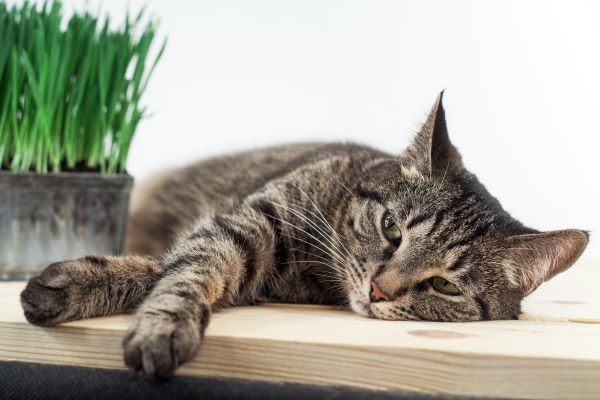
These vet visits can also potentially help you avoid significant medical expense in the long term, if a sick cat goes untreated. Routine check-ups and tests allow your veterinarian to establish your kitty’s baseline health, which means both you and the vet are more likely to notice when something is amiss.
Keeping your cat’s vaccination schedule up-to-date greatly reduces the risk of them contracting a number of serious, and in some cases potentially deadly, health conditions.
Preventative Measures
You play a key role in helping your cat combat any ailments and stay as healthy as possible.
In addition to monitoring your pet’s health and behaviour closely, there are several really important things you can actively do to help your furry friend stay in tip-top condition.
Regular vet checks
- Take your cat to the vet at least once a year for a general checkup.
- When in doubt, go to the vet. Take your cat to the vet as soon as possible if you notice any unusual symptoms or signs.
Learn more: Finding the right vet
Vaccinate (and keep up to date)
Make sure your cat has all the necessary vaccinations for their environment and lifestyle.
Learn more: Cat and kitten vaccination schedule & cat vaccination costs
Use flea, tick and parasite prevention
Give your cat vet-recommended medications to protect them against pests and pest-borne diseases.
Learn more: Controlling & protecting against fleas
Good hygiene
- Washing your hands before and after preparing food is essential for preventing the spread of sickness and disease among all your family members, including your cats.
- Regularly clean or tidy up your cat’s environment, such as floors, bedding and toys, to keep it free of harmful objects such as glass, grass awns or splinters, bacteria or parasites.
Good food choices
- Feed your cat a premium, high-quality, balanced and complete cat food free of artificial ingredients, preservatives and fillers.
- Cats can get sick from eating spoiled food, contaminated water or other substances that are toxic to cats. Try to prevent your cat from eating anything that could make them sick.
Exercise
All cats require a certain amount of physical exertion to maintain their body condition and help regulate their weight. Provide mental as well as physical stimulation with games, interactive toys and puzzles, scratching posts and climbing frames.
Learn more: Cat play and toys – it’s not just fun & games!
Brush and brush
Keep your cat’s coat in good condition by grooming them regularly. Brushing the coat stimulates oil production in the skin, which helps keep the coat shining and healthy.
Good dental care is essential for your cat’s long-term health and happiness, and this includes monitoring your cat’s teeth – and brushing them if they allow it! When the teeth are clean, the gums stay healthy and the risk of dental disease and infections is greatly reduced. Bad breath is often one of the first signs that their dental health is suffering, so be sure to watch out for this.
Learn more: Maintaining your pets’ dental hygiene
Common health issues in cats
The table below provides an overview of common health issues for most cats, including dental disease, arthritis, and allergies. It also lists some of the common signs of each health issue and some of the steps to take to prevent them in the first place.
Common cat illnesses |
Signs & symptoms |
Preventative measures |
| Ear infections | Shaking the head, scratching or pawing the ears, redness, discharge, moisture, crusting or bad smell |
|
| Skin allergies | Redness, itching, scratching, broking skin, secondary infections |
|
| Arthritis | Limping or lameness, favouring one or more limbs, difficulty with movements that were previously manageable, such as climbing stairs, slower to get on their feet, far less active than they used to be |
|
| Dental disease | Gingivitis (inflammation of the gums), broken or cracked teeth, loose teeth, tooth decay |
|
| Gastrointestinal disorders | Diarrhoea, vomiting, constipation |
|
| Urinary system disorders | Urination in inappropriate places, blood in the urine, straining to urinate, frequent urination, behaviour changes |
|
In a nutshell…
As a loving pet parent, you want to do all you can to prioritise your kitty’s wellbeing. Therefore, it’s really important that you know what signs and symptoms to look out for so that you can address any health concerns that crop up in a timely manner.
If you suspect that your fur baby is unwell or just not their usual self, consult your vet for advice. Remember that cats tend to hide their symptoms as much as possible, so they may already be sicker than you think.
Just as importantly, don’t put off going to the vet for routine check-ups, vaccinations, dental checks, dietary and weight checks, and parasite prevention, all of which play a key role in ensuring your pet’s ongoing good health. Many conditions, including dental disease and arthritis, can be detected early during regular six-monthly check-ups with your vet.
And finally, play your part in proactively managing your cat’s health. Optimising their diet, ensuring they get as much exercise as they need, maintaining their coat and practising good hygiene are some of the very beneficial things you can do as a responsible and loving pet owner.
Bow Wow Meow Pet Insurance can help protect you and your cat should an unexpected trip to the vet occur.
-
Find out more about our cat insurance options
-
Get an online pet insurance quote
Bow Wow Meow is proud to have been awarded winner of Canstar’s ‘Most Satisfied Customers’ Award in the Pet Insurance category for both 2024 and 2025!
Bow Wow Meow is proud to have been chosen as Product Review’s Pet Insurance Award Winner every year from 2018 to 2025! This is based on 2,995 independent customer reviews (as at 21/01/2025), with an overall rating of 4.3*
Google Review rating = 4.5* (based on 968 reviews)
Trust Pilot rating = 4.6* (based on 531 reviews)
Bow Wow Meow is proud to have been chosen as Product Review’s Pet Insurance Award Winner every year from 2018 to 2025! This is based on 2,995 independent customer reviews (as at 21/01/2025), with an overall rating of 4.3*
Google Review rating = 4.5* (based on 968 reviews)
Trust Pilot rating = 4.6* (based on 531 reviews)
Bow Wow Meow has been chosen as a winner in the Finder Pet Insurance Awards 2024. Finder’s panel of experts analysed over 140 quotes to award our Ultimate Care Plan the winner of the “Pet Insurance – Value” category.




